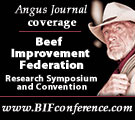Have We Lost the Argument
on Animal Welfare?
Livestock producers need to listen to those who don't understand production practices in order to find the means to communicate more effectively.
Has the livestock industry already lost the battle over animal welfare? Dave Daley, a rancher and an educator at California State University–-Chico, thinks the war is not lost, but livestock producers have lost plenty of battles. Speaking during the 2015 Cattle Industry Convention & NCBA Trade Show, Daley told a Feb. 4 Cattlemen’s College® audience that too many livestock producers forget that communication is a two-way street.
Daley said he’s just like most producers who believe theirs is a noble cause. After all, they raise food to feed the world. Many producers are willing to tell their story. The problem is that most of those same people don’t like to listen.
“You can’t tell [animal welfare activists] that you have a noble cause but it’s none of their business how you do it,” stated Daley.
Talking down to people who question livestock production practices is a common mistake, said Daley. You can’t win converts by making fun of people who question what you believe is common sense. Neither does it work to bolster your argument with scientific research when people have ethical questions.
“You shouldn’t say, ‘Of course we treat our animals well, or we wouldn’t make any money.’ That’s a poor argument,” warned Daley, adding that too many people already think producers are “only in it for the money.”
Daley said the hardest thing to do is what needs to be done, and that is to listen.
“Good people can look at the same issue differently. Don’t assume that because someone disagrees with you, they are stupid, evil or both. Don’t be too quick to judge or you may miss an opportunity,” he advised.
Daley urged producers to remember that every person’s perceptions are formed as a result of the view through a detractor’s window. Think about the practices in question and how it may look to someone who doesn’t understand why it is done. By listening and communicating respectfully, there often is opportunity to build trust in the livestock producer’s desire to honestly address animal welfare.
Daley also advised producers to consider the scope of animal welfare as it applies to the beef industry. While it is not typically associated with cases of extreme confinement, such as battery cages for hens or farrowing crates for sows, there are short-term pain experiences associated with castration, branding, ear-marking and dehorning. The potential for stress associated with transportation may not be fully understood. While the beef industry is not doing a “bad job” and not a lot of big changes are needed, it’s likely that improvements to current practices will come incrementally.
“We have some time to make improvements before somebody tells us what we have to do,” said Daley. “We can always do better, so we can’t be smug or arrogant."

Editor’s Note: Troy Smith is a freelancer and
cattleman from Sargent, Neb.





